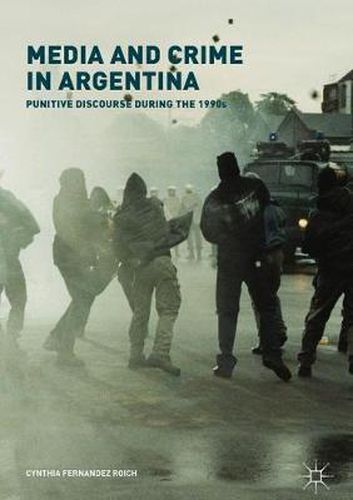Readings Newsletter
Become a Readings Member to make your shopping experience even easier.
Sign in or sign up for free!
You’re not far away from qualifying for FREE standard shipping within Australia
You’ve qualified for FREE standard shipping within Australia
The cart is loading…






This title is printed to order. This book may have been self-published. If so, we cannot guarantee the quality of the content. In the main most books will have gone through the editing process however some may not. We therefore suggest that you be aware of this before ordering this book. If in doubt check either the author or publisher’s details as we are unable to accept any returns unless they are faulty. Please contact us if you have any questions.
This book analyses the punitive crime discourse in the Argentinean press during the 1990s. Fernandez Roich focusses on several features of media discourse during this time, such as: the notion that petty criminals ‘deserve to die’ in reference to police brutality and killings, the phenomenon of ‘vindicators’ or how common citizens turned into ‘evil’ modern heroes in the press, and the parallelism between the military discourse under the military regime and the punitive discourse under democracy. In addition, the book also investigates the alleged natural propensity towards breaking the law ingrained within Argentinean culture, the so-called ‘viveza criolla’ and the well-ingrained idea that to get ahead you have to participate in corrupt practices. Despite the significant scholarly interest in the United States and Europe in the last Argentinean dictatorship (1976-1983), little attention has been paid to the role of Argentinean newspapers in supporting the military coup d'etat. The analysis of this media discourse is critical to understanding the support enjoyed by the armed forces in power: the vast majority of the population was not informed about the disappearances or the concentration camps until well into the 1980s. This project provides an in-depth qualitative content analysis of front pages, chronicles, editorials and photographs of Argentinean newspapers before and after the military intervention that will aid scholars of criminal justice and Latin American political regimes understand the impact of the support given to the military government.
$9.00 standard shipping within Australia
FREE standard shipping within Australia for orders over $100.00
Express & International shipping calculated at checkout
This title is printed to order. This book may have been self-published. If so, we cannot guarantee the quality of the content. In the main most books will have gone through the editing process however some may not. We therefore suggest that you be aware of this before ordering this book. If in doubt check either the author or publisher’s details as we are unable to accept any returns unless they are faulty. Please contact us if you have any questions.
This book analyses the punitive crime discourse in the Argentinean press during the 1990s. Fernandez Roich focusses on several features of media discourse during this time, such as: the notion that petty criminals ‘deserve to die’ in reference to police brutality and killings, the phenomenon of ‘vindicators’ or how common citizens turned into ‘evil’ modern heroes in the press, and the parallelism between the military discourse under the military regime and the punitive discourse under democracy. In addition, the book also investigates the alleged natural propensity towards breaking the law ingrained within Argentinean culture, the so-called ‘viveza criolla’ and the well-ingrained idea that to get ahead you have to participate in corrupt practices. Despite the significant scholarly interest in the United States and Europe in the last Argentinean dictatorship (1976-1983), little attention has been paid to the role of Argentinean newspapers in supporting the military coup d'etat. The analysis of this media discourse is critical to understanding the support enjoyed by the armed forces in power: the vast majority of the population was not informed about the disappearances or the concentration camps until well into the 1980s. This project provides an in-depth qualitative content analysis of front pages, chronicles, editorials and photographs of Argentinean newspapers before and after the military intervention that will aid scholars of criminal justice and Latin American political regimes understand the impact of the support given to the military government.